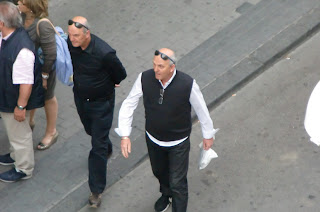Here's LACMA's blurb:
"As a show of thanks to the many communities which saw and hosted the historic transport of
the 340-ton boulder that is now part of Michael Heizer’s Levitated Mass at LACMA, the museum is offering free admission to residents of select zip codes during the week of June 24 to July 1."
Among those zip codes are these from Long Beach: 90802, 90803, 90804, 90805, 90806, 90807, 90808, 90810, 90813, 90814, and 90815. For more qualifying zip codes, go HERE .
What IS Levitated Mass ? Here's what LACMA says:
"Levitated Mass by artist Michael Heizer is composed of a 456-foot-long slot constructed on LACMA's campus, over which is placed a 340-ton granite megalith. As with other works by the artist, such as Double Negative (1969), the monumental negative form is key to the experience of the artwork. Heizer conceived of the artwork in 1968, but discovered an appropriate boulder only decades later, in Riverside County, California. Taken whole, Levitated Mass speaks to the expanse of art history, from ancient traditions of creating artworks from megalithic stone, to modern forms of abstract geometries and cutting-edge feats of engineering."
The work was unveiled this past weekend, as you can see below.
I'm sure a number of you were aware of the boulder as it made its way through the area. Here are a few of the photos I took as it was headed down Atlantic Ave. from Bixby Knolls, over the 405, and past Spring St.
Among those zip codes are these from Long Beach: 90802, 90803, 90804, 90805, 90806, 90807, 90808, 90810, 90813, 90814, and 90815. For more qualifying zip codes, go HERE .
What IS Levitated Mass ? Here's what LACMA says:
"Levitated Mass by artist Michael Heizer is composed of a 456-foot-long slot constructed on LACMA's campus, over which is placed a 340-ton granite megalith. As with other works by the artist, such as Double Negative (1969), the monumental negative form is key to the experience of the artwork. Heizer conceived of the artwork in 1968, but discovered an appropriate boulder only decades later, in Riverside County, California. Taken whole, Levitated Mass speaks to the expanse of art history, from ancient traditions of creating artworks from megalithic stone, to modern forms of abstract geometries and cutting-edge feats of engineering."
The work was unveiled this past weekend, as you can see below.
I'm sure a number of you were aware of the boulder as it made its way through the area. Here are a few of the photos I took as it was headed down Atlantic Ave. from Bixby Knolls, over the 405, and past Spring St.
See LACMA's WEBSITE for information about the other current exhibits (including a tribute to the title sequences from James Bond movies!).





















